Category Archives: AOA News Letter
CHIEF OMBUDSMAN MR. MEHMET AKARCA HIGHLIGHTS THE CENTRAL ROLE OF THE FAMILY IN SHAPING SOCIETY.
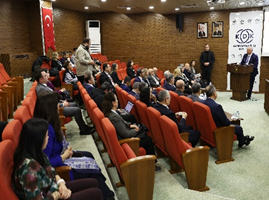
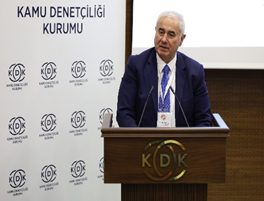
The 5th Traditional Academicians’ Meeting themed “Family Themed Special Issue of the National Peer-Reviewed Ombudsman Academic Journal” was held on 20 January 2026 under the leadership of Chief Ombudsman Mr. Mehmet Akarca, with the participation of Ombudsmen, the Secretary General of the Ombudsman Institution, and contributing academicians.
In his address, Mr. Akarca emphasized that the Ombudsman Institution complements the judiciary and examines complaints many of which directly or indirectly concern families within a maximum of six months, including applications submitted by children. He stressed that administrative decisions affect not only individuals but also families and society as a whole.
Noting that the family has become increasingly fragile in today’s world, Mr. Akarca stated that the special issue addresses contemporary challenges faced by families from legal, sociological, and public policy perspectives, and contributes to strengthening social solidarity. He thanked the contributing academicians and expressed his hope that the knowledge produced would guide public policies and practices in support of a strong family and a strong society.
OMBUDSMAN HOLDS VIRTUAL DIALOGUE WITH UN REPRESENTATIVES ON OBTAINING “A” STATUS.
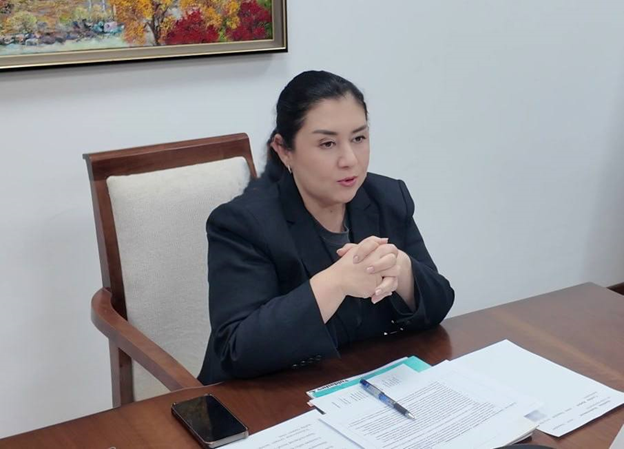
On 23 January 2026, an online meeting was held between the Commissioner of the Oliy Majlis of the Republic of Uzbekistan for Human Rights (Ombudsman) and representatives of the Office of the United Nations High Commissioner for Human Rights.
During the virtual dialogue, issues related to upgrading the international status of the Ombudsman Institution to “A” status were discussed in detail. In particular, it was noted that the recommendations provided by the Global Alliance of National Human Rights Institutions when the Ombudsman was granted “B” status in 2020 have been implemented in a phased manner. Emphasis was placed on the improvement of the legislative framework governing the Ombudsman’s activities, the establishment of regional representatives, as well as membership in reputable international structures, including the Ombudsmen of Turkic-speaking states, the Eurasian Alliance of Ombudsmen and National Human Rights Institutions, and the Asia-Pacific Forum of National Human Rights Institutions. The signing of cooperation memoranda with ombudsmen of Central Asian countries, Serbia, Hungary, Italy, Mongolia, and Denmark was also noted.
The meeting particularly emphasized that, as a result of systemic reforms carried out in Uzbekistan in recent years in the field of human rights, the institutional capacity of the Ombudsman Institution has been consistently strengthened.
The online meeting was attended by Omer Fisher, Human Rights Adviser of the Regional Office of the Office of the United Nations High Commissioner for Human Rights for Central Asia, as well as experts Matthias Klettermaier and Joana Miquel Gelabert, who shared their views and proposals.
It was also noted that within the framework of cooperation with ombudsmen of foreign states accredited with “A” status, best practices are being studied, and cooperation with civil society representatives is being consistently enhanced. In this process, close collaboration with civil society institutions is carried out during monitoring visits, the review of complaints, and the preparation of alternative reports.
At the conclusion of the dialogue, an exchange of views took place on organizational and institutional measures to be implemented in connection with the review of the Ombudsman Institution’s status by the Global Alliance of National Human Rights Institutions.
DEPUTY OMBUDSMAN OF TIMOR-LESTE HIGHLIGHTS NATIONAL EFFORTS AND CHALLENGES AT ASEAN DIALOGUE ON HUMAN RIGHTS AND POLICING.
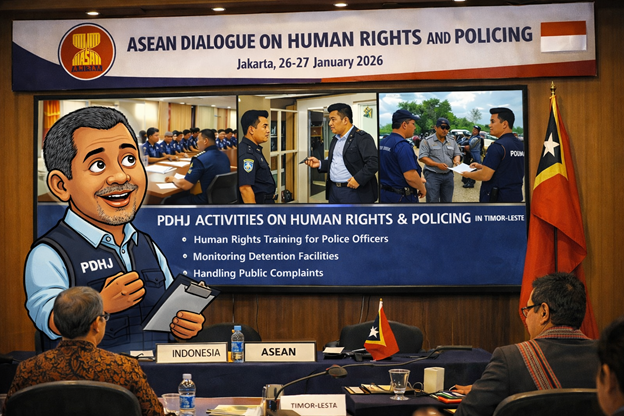
Jakarta, Indonesia, 26-27 January 2026 – From January 26-27, 2026, the ASEAN Intergovernmental Commission on Human Rights (AICHR) hosted its second regional Dialogue on Human Rights and Policing in Jakarta, Indonesia. Among the distinguished speakers was Mr. Rigoberto Monteiro, Deputy Ombudsman (Deputy Provedor) of Timor-Leste’s Office of the Provedor for Human Rights and Justice (PDHJ). Participating virtually in the opening session, Monteiro contributed to foundational discussions on international human rights standards, national legal frameworks, and the practical challenges of integrating rights-based approaches into policing across ASEAN.
In his presentation, Monteiro outlined PDHJ’s strategic work in promoting human rights and good governance, emphasizing its role in building public trust through community engagement. He detailed PDHJ’s capacity-building initiatives, noting that since 2015, the institution has trained over 729 National Police officers on human rights principles. Additionally, PDHJ conducts regular monitoring of detention facilities and public events to prevent violations, and handles public complaints—65 of which, between 2015 and 2025, were lodged against police and defense forces, often concerning allegations of torture or ill-treatment.
Monteiro also candidly addressed ongoing challenges, including political interference, the influence of martial arts groups and veterans on police work, and instances where security personnel have been directly involved in violence against communities. He called for enhanced regional support, urging AICHR to facilitate Timor-Leste’s fuller integration into ASEAN human rights mechanisms, align thematic programs with national priorities such as combating torture, and promote peer learning and institutional collaboration.
Looking ahead, the Deputy Ombudsman outlined PDHJ’s future actions, which include strengthening investigative capacities for complaints against police, reviewing cooperation agreements with the national police, and advocating for the ratification of the Optional Protocol against Torture. His participation underscored Timor-Leste’s proactive, yet evolving, engagement in regional human rights dialogues and highlighted the shared ASEAN journey toward policing that upholds dignity, accountability, and public trust.
THE OMBUDSMAN PARTICIPATES IN THE DISCUSSION OF THE NEW DRAFT BILL ON THE CHILDREN’S RIGHTS OF THE REPUBLIC OF AZERBAIJAN.
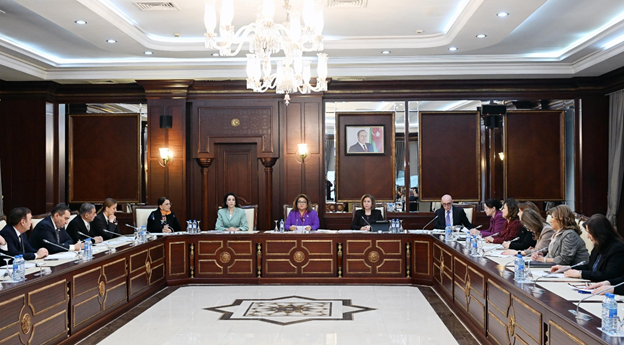
The Commissioner for Human Rights (Ombudsman) of the Republic of Azerbaijan, Sabina Aliyeva, participated in the parliamentary discussion of the new draft bill on the rights of children of the Republic of Azerbaijan.
The Ombudsman in her speech highlighted the relevant complex reforms consistently carried out by the country’s president, Ilham Aliyev, and the First Vice-President and the President of the Heydar Aliyev Foundation, Mehriban Aliyeva, and the significant accomplishments in child well-being.
From the point of regulating new social relations, S. Aliyeva highly appreciated the development of a new draft bill, which aims to improve the regulatory basis. She also underlined that the provisions in the new draft bill are very important in terms of the implementation of the recommendations to the state periodic reports made by the UN Committee on the Rights of the Child (CRC).
The Commissioner reiterated the expansion of her mandate to function as an independent monitoring mechanism for the monitoring and promotion of the implementation of the UNCRC by amending the Constitutional Law on the Ombudsman, which was also provided for in the current Law of the Republic of Azerbaijan “On the Rights of Child.”
- Aliyeva said that the Ombudsman’s recommendations, made to the present draft bill and drafts of other related legal and normative acts, were considered by the corresponding authorities. It was specified that the Ombudsman’s recommendations put forward in general and to the current draft bill took into account the provisions of the UNCRC and the Optional Protocol thereto. In addition, the Ombudsman’s annual reports also provided recommendations proposed for amending the relevant legislation.
The Ombudsman stressed the importance of the norms containing the new draft bill from the perspective of the prevention of children from falling into difficult situation, ensuring their social protection, considering the best interests of children when carrying out any proceedings in relation to them, developing the combating of violence against them, and overall, for more effective protection of the children’s rights.
During the discussions, Hijran Huseynova, the Chairwoman of the Parliamentary Committee for Family, Women and Child Affairs, shared her views about current challenges in the field of ensuring the rights of children, as well as the significance of the normative and legal framework.
The exchange of views was held also around the issues in relation to improving the mechanisms for effective enforcement of the children’s rights and freedoms, shaping the legal framework to meet the requirements of modern era, and the harmonization of the national legislation with international standards, along with the norms of the new bill.
ACRC ANNOUNCES ITS 2025 ACHIEVEMENTS IN COMMEMORATION OF INTERNATIONAL ANTI-CORRUPTION DAY (DEC. 9).

– Marking the International Anti-Corruption Day on Dec. 9, ACRC announced key anti-corruption policy achievements … Strengthening integrity education for future generations, solidifying the Conflict of Interest Prevention Act, hosting the APEC anti-corruption meeting, etc.
The Anti-Corruption and Civil Rights Commission (ACRC, Chairperson Ryu Chul Whan) announced its 2025 anti-corruption performance on December 9 to mark International Anti-Corruption Day.
* December 9 is designated as International Anti-Corruption Day, commemorating the UN’s 2003 signing ceremony for the UN Convention against Corruption in Mérida, Mexico.
In February 2025, Transparency International (TI) published the 2024 Corruption Perceptions Index (CPI) in which Korea scored 64 out of 100, ranking 30th out of 180 countries-its highest score and rank to date.
Beyond being merely a score or ranking, CPI is a key indicator affecting national competitiveness and economic growth, requiring whole-of-government management and improvement efforts.
Accordingly, as the lead anti-corruption agency, the ACRC has since early this year focused on five key policies to improve CPI: building a foundation to strengthen integrity education for future generations; ensuring the stable implementation of the Conflict of Interest Prevention Act for Public Officials; strict handling of corruption cases involving fiscal waste; strengthening whistleblower protection and support systems, including expanded relief payments; and the successful hosting of the APEC anti-corruption meeting.
① Laying the Groundwork to Strengthen Integrity Education for Future Generations
The ACRC focused its efforts this year on strengthening integrity education for future generations. In August, it established a dedicated task force within the Anti-Corruption Training Institute and has been faithfully implementing the “mandatory integrity education for future generations,” a task adopted as a national agenda under the Lee administration.
The ACRC concluded MOUs on integrity education with all 17 metropolitan and provincial offices of education nationwide, as well as with 25 universities.
Based on this cooperation system, the ACRC operated “Visiting Classes for Integrity Experience” at 60 elementary, middle, and high schools, and distributed integrity education content tailored to elementary students through the education offices, enabling about 38,000 students at 142 elementary schools nationwide to learn about integrity.
In addition, integrity special lectures were offered at 20 universities this year, and at four, including Hanyang University, Jeonbuk National University, UNIST, and the Korea National University of Education, integrity courses were opened as credit-bearing regular classes.
② Stable Implementation of the Conflict of Interest Prevention Act
The ACRC worked to ensure that the Conflict of Interest Prevention Act, implemented in 2022, takes firm root in the public sector. The Act was enacted to prohibit public officials from pursuing private interests related to their official duties, thereby preventing conflicts of interest that may arise during duty performance and ensuring fair execution of duties.
To support public officials’ understanding and adaptation in the Act’s third year of enforcement, the ACRC: introduced a QR code-based self-diagnosis service to easily check for conflicts of interest; produced and distributed a guideline for preventing conflicts of interest in local councils and quarterly “Get it Right” card news; and held regional briefings for 798 agencies and 1,169 public officials.
③ Strict Handling of Corruption Cases Involving Fiscal Waste
The ACRC identified and remedied structural corruption causing significant losses to national finances through systematic fact-finding.
First, it received reports and uncovered public institutions that, in violation of government guidelines, over-allocated about 600 billion won in personnel expenses over the past eight years, and requested audits by supervisory agencies.
It also found improper execution of about 2.5 billion won, such as purchasing expensive personal items as “training expenses” and notified supervisory bodies to recover the funds, while demanding institutional improvements including sanction provisions for improper spending.
In July, a full review of seed release projects in the southwestern seas uncovered bid-rigging worth 10.3 billion won and delivery fraud worth 6.8 billion won-a total of 17.1 billion won-which was referred to the Korea Coast Guard.
Separately, to scrutinize entrenched corrupt practices in education, all 17 metropolitan/provincial education offices were inspected, revealing improper cases totaling 300 million won, including overpayments of overseas travel per diem, execution of ancillary facility costs, and operation of resort facilities.
④ Strengthening Whistleblower Protection & Support, Including Expansion of Relief Payments
Whistleblower protection and support systems, including relief payments, were significantly reinforced. Relief payments are monetary support provided to public-interest whistleblowers and their relatives/household members to compensate for damages or costs incurred due to reporting.
This year, the ACRC doubled the outpatient treatment cost limit covered by relief-from 1 million won to 2 million won-and shortened the average processing time for relief applications by 33.6% year-on-year to ensure timely support for whistleblowers.
To ly and effectively resolve situations where whistleblowers face disadvantages from their organizations due to reporting, the ACRC actively used the settlement recommendation system. While only five recommendations were made over the past five years, six were issued in 2025 alone, helping parties amicably and ultimately resolve conflicts.
To further bolster the foundation of whistleblower protection and support, the Act on the Protection of Public Interest Whistleblowers was revised to introduce a system for temporarily suspending procedures for disadvantageous measures.
For the Act on the Prevention of Corruption and the Establishment and Management of the ACRC, draft amendments were prepared and preannounced to: prohibit claims for damages against whistleblowers; and add attempts to identify whistleblowers, obstruct reporting, or coerce withdrawal of reports as grounds for presuming disadvantageous measures.
⑤ Successful Hosting of APEC Anti-Corruption Meetings
In February and July, the ACRC held the 40th and 41st APEC Anti-Corruption and Transparency Working Group plenaries to discuss the need to strengthen anti-corruption policies in the Asia-Pacific and practical cooperation measures.
From July 31 to August 1, ACRC hosted APEC’s first-ever High-Level Anti-Corruption Dialogue in Songdo, Incheon.
Ministers and vice ministers from 20 member economies, along with experts from international organizations and the private sector, attended. They focused on international cooperation to counter corruption crimes for prevention and eradication, strengthening public-private partnerships, and cooperation in international anti-corruption education, while sharing Korea’s anti-corruption policies such as the Clean Portal system, Comprehensive Integrity Assessment of Public Institutions, and multinational anti-corruption capacity-building training.
By sharing the outcomes of the APEC anti-corruption meetings with the international community-at the G20 Anti-Corruption meeting in South Africa in October and the Conference of the Parties of the International Anti-Corruption Academy (IACA) in Vienna, Austria, in November-Korea solidified its status as a global leader in integrity.
ACRC Chairperson Ryu Chul Whan said, “Through the 2025 five key anti-corruption policies, the ACRC has worked to spread a culture of integrity not only in the public sector but across society as a whole.”
He added, “I thank everyone who has worked to build a clean and fair society this year, and next year we will do our utmost to continuously improve the level of national integrity, strengthen national competitiveness, and deliver results the public can truly feel.”
OMBUDSMAN ANNOUNCES RESULTS OF DIRECT INVESTIGATION OPERATION INTO GOVERNMENT’S WORK ON LANDSLIDE PREVENTION AND MITIGATION AND MANAGEMENT OF GOVERNMENT SLOPES.

The Ombudsman, Mr. Jack Chan, today (8 January) announced the completion of a direct investigation operation into the work of the Government of the Hong Kong Special Administrative Region on landslide prevention and mitigation as well as management of government slopes, with 32 major recommendations for improvements made to the Civil Engineering and Development Department (“CEDD”), the Lands Department (“LandsD”), the Highways Department (“HyD”), the Water Supplies Department (“WSD”) and the Architectural Services Department (“ArchSD”).
On 14 November 2024, the Office of The Ombudsman (“the Office”) announced the launch of a direct investigation operation into the Government’s monitoring and regulation of slope safety. Given the extent and complexity of the topic, the Office decided to initiate two direct investigation operations under a series approach to focus on the different aspects involved more effectively. While the first direct investigation operation announced by the Office today examines in detail the Government’s landslide prevention and mitigation work, and its management of government man-made slopes, the second operation to be completed and announced later will focus on the authorities’ determination of slope maintenance responsibility and risk management of private man-made slopes.
Mr. Chan said, “Hong Kong is densely populated and characterised by its hilly terrain and scarcity of land. Coupled with the increasing occurrence of extreme weather events, the risk of severe landslides is indeed a significant hazard, posing potential threats to the public’s daily activities, lives and property.
“Since the establishment of the Geotechnical Engineering Office in 1977, CEDD has endeavoured to enhance slope resilience against severe weather through a comprehensive slope safety system. The landslide risk in Hong Kong has been substantially lowered compared with the early years. This is an achievement as a result of the CEDD’s immense efforts over the past decades. The Office highly commends the CEDD’s work. We are also pleased to note that the current-term Government has introduced multiple forward-looking measures to continuously strengthen the overall capacity in coping with extreme weather through four key strategies, namely advance preparedness, enhanced early warning, decisive emergency response and speedy recovery. Meanwhile, the current-term Government vigorously applies innovative technologies, including the development of a Smart Slope Catalogue, to ensure that landslide prevention and mitigation work keep pace with the times.
“As global climate change intensifies, slope safety in Hong Kong will face new challenges and risks. CEDD should continuously keep up with an innovative spirit and strive for excellence, in order to safeguard the monitoring and regulation of slope safety. As regards the four departments with maintenance responsibility for the majority of government man-made slopes (namely LandsD, HyD, WSD and ArchSD), we consider these departments to have carried out slope maintenance and repairs in accordance with their respective purview and the technical guide issued by CEDD, and have arranged emergency inspections and repairs after landslide incidents. Nevertheless, we still find room for improvement on the part of all departments concerned in the safety management of natural hillside catchments and government man-made slopes, as well as interdepartmental collaboration.”
Around 60 per cent of Hong Kong’s land area is covered by natural hillsides. There are also a vast number of man-made slopes. As of December 2024, there were around 61,000 registered man-made slopes across Hong Kong, comprising around 38,600 government man-made slopes, 15,800 private man-made slopes and 6,300 man-made slopes with mixed maintenance responsibility. During the investigation, investigators of the Office examined a large volume of data (including Hong Kong’s landslide data from more than 35 years since 1989, and data on relevant works and studies undertaken by CEDD since 2010 under the Landslip Prevention and Mitigation Programme), as well as more than 50 landslide incidents involving natural hillside catchments or government man-made slopes. In addition to scrutinising documents, investigators also shadowed departmental staff in conducting seven site visits to acquire a comprehensive understanding on the CEDD’s work on landslide prevention and mitigation, and slope maintenance audits, as well as how various maintenance departments carry out maintenance inspections to government man-made slopes under their purview.
Over the past decade (2015 to 2024), an annual average of around 214 landslides was recorded in Hong Kong, nearly one-third below the annual average of around 300 landslides between 1989 and 2014. While natural hillside catchments generally do not require regular inspections or maintenance, CEDD identifies those with higher potential risks for inclusion in the Programme to carry out risk mitigation works. Between 2015 and 2024, nearly 25 per cent of landslides involved natural hillside catchments. Upon review of nine serious landslides that occurred since 2008, the Office found that most involved natural hillside catchments. A majority of them had not been included in the Programme before the incidents, or even if they had already been so included, they were accorded a relatively low priority such that the actual study and design of the works had yet to commence by a consultancy contract of the programme before the incidents.
As for government man-made slopes, among the landslides that occurred between 2015 and 2024, more than 40 per cent involved government man-made slopes and around 5 per cent involved private man-made slopes. As there are far more government man-made slopes than private ones, the higher number of incidents involving government man-made slopes is understandable. However, discounting the actual difference in the number of incidents involving the two kinds of slopes, the Office found that the failure rate (Note 1) of government man-made slopes (annual rate from 0.1 to 0.6 per cent) was still higher than that of private man-made slopes (annual rate from 0.03 to 0.3 per cent) by one to three times between 2020 and 2024. Undeniably, the failure rates of both government and private man-made slopes remained at a very low level of less than 1 per cent each year. In addition, the consequence-to-life category (Note 2) of nearly 80 per cent of the government man-made slopes with landslides was either the lower category 2 or 3. Nevertheless, the Office considers that the higher failure rate of government man-made slopes compared to private ones still warrants the Government’s continuous attention.
Furthermore, having reviewed those relatively more serious landslides involving government man-made slopes since 2014, the Office found that some of the slopes recorded repeated landslides within three years since the first incident, and that a particular slope even recorded four landslides at different parts within five years. Although the consequence-to-life category of all these government slopes with repeated landslides was not the highest category 1, and not every incident was large in scale, the recurrence of incidents inevitably raises concerns about the potential risks and structural safety of these slopes.
Mr Chan said, “The Office is pleased to learn that during our investigation, CEDD proactively proposed improvement measures, including increasing the annual targets of the Programme progressively within three years from 2025, with the number of natural hillside catchments for risk mitigation works increased from 30 to 40 and that of government man-made slopes for upgrading works increased from 150 to 200. CEDD has also identified three natural hillside catchments with similar geological conditions as Yiu Hing Road, Shau Kei Wan and included them in the Programme for assessment and risk mitigation works. In addition, the department will prioritise man-made slopes with greater potential impact on people’s livelihood, especially those adjacent to the sole vehicular access, and systematically include them in the Programme for upgrading works.
“Summing up our findings, we recommend that CEDD adopt measures to further enhance slope safety management. Meanwhile, all relevant departments should continue to deepen collaboration, foster exchanges of views and sharing of experiences so that their landslide prevention and mitigation work can be carried out more precisely and effectively. Finally, although the current landslide risk is substantially lower than decades ago, the authorities must remain vigilant in the face of slope degradation and the threat of extreme rainfall, and be well prepared for tough times. Landslide prevention and mitigation works are crucial for slope safety, yet call for the public’s understanding for the inconvenience inevitably caused during the works period. I appeal to members of the public to support the Government’s landslide prevention and mitigation work and work together to safeguard public safety.”
Overall, the Office has made 32 recommendations to CEDD, LandsD, HyD, WSD and ArchSD regarding the implementation of the Programme, safety management of natural hillside catchments and government man-made slopes, application of technologies and interdepartmental collaboration. The Office is pleased to note that the departments above have accepted all the recommendations.
The Office’s major recommendations for improvement to the departments include:
- CEDD should actively explore the feasibility of expediting risk mitigation works for the three natural hillside catchments already included in the Programme which have similar geological conditions as Yiu Hing Road, Shau Kei Wan;
- CEDD should continue with its regular review on any room to optimise the current selection criteria of natural hillside catchments for inclusion in the Programme, so that those with potential risks can be identified earlier;
- CEDD should continue to take note of any considerable differences in the failure rates between government and private man-made slopes, examine the underlying causes and formulate proper counter-measures where necessary;
- If its examination reveals any areas for improvement in the maintenance of government man-made slopes on the part of the maintenance departments, CEDD should continue to issue technical guidelines for their compliance;
- CEDD should continue with its regular review on any room to optimise the current selection criteria of government man-made slopes for inclusion in the Programme for upgrading works (for example, allowing more flexibility in prioritising slopes with repeated landslides under the programme according to actual circumstances);
- CEDD should continue to enhance the management of landslide prevention and mitigation works and slope maintenance audits as well as the planning of post-landslide response actions through the gradual increase of slope monitoring and management data, coupled with AI and big-data analytics;
- CEDD should explore expanding the scope of slope maintenance audits to include post-incident investigations and response actions involving government man-made slopes, with a view to reviewing the performance of maintenance departments from multiple perspectives and identifying possible areas for improvement, thereby learning from experience and nipping landslide risks in the bud; and
- All relevant departments (including LandsD, HyD, WSD and ArchSD) may make use of the Centralised Slope Maintenance Database being developed by CEDD and the Smart Slope Catalogue for data analytics to monitor the latest situations of slope maintenance, share common maintenance issues, and assess the impact of heavy rainfall on slopes. This should facilitate their planning of routine maintenance inspections and special inspections after adverse weather events, leading to higher efficiency.
The full investigation report is available on the website of the Office of The Ombudsman for public information.
Note 1: (Number of government or private man-made slopes with landslides/Total number of government or private man-made slopes) × 100 per cent.
Note 2: The consequence-to-life category reflects the potential severity of casualties in the event of slope failure. It is classified into three levels from highest to lowest: category 1, category 2 and category 3.
WAFAQI MOHTASIB (OMBUDSMAN) INSTITUTION MARKS 43RD ANNIVERSARY OF ITS ESTABLISHMENT.
Islamabad: 23 January 2026 – Owing to the persistent efforts, hard work and devotion of the Officers and staff members, the institution of Wafaqi Mohtasib has emerged as an instrument and model of good governance in the country, enjoying the trust and confidence of the general public.
This was stated by the Wafaqi Mohtasib (Federal Ombudsman), Mr. Ejaz Ahmad Qureshi in a message issued on the eve of 43rd anniversary of the establishment of the Office of Wafaqi Mohtasib in the country, observed every year on 24th January.
He said that 24 January holds a special significance in the history of the institution. Having come into existence on this day in 1983, the institution has completed 43 momentous years of growth and unmatched service to the people. During its long journey, it has provided relief to more than 2.5 million households, mostly belonging to the disadvantaged and marginalized segments of the society, he observed.
The Wafaqi Mohtasib further stated that through its persistent efforts, the Institution has fostered a culture of transparency, responsiveness and accountability within the government offices and departments, thereby promoting the core values of good governance and the rule of law. Throughout this period, the institution has continuously striven to expand its outreach and accessibility with a view to facilitating dispensation of administrative justice to the general public, closer to their homes, he maintained.
The stature that the institution enjoys today, he said, would not have been possible without the untiring efforts of his colleagues at the Head Office and the Regional Offices. They conform to the highest standards of public service, devotion to duty and perseverance. The Wafaqi Mohtasib called upon the Officers and staff members to redouble their efforts for speedy redressal of public complaints adding that it is about time to renew our unwavering commitment to the cause of Ombudsmanship and steadfast adherence to its core values. He expressed the confidence that the office would go from strength to strength in the days to come.
ACRC PUSHES FOR AMENDMENTS TO THE ACT ON THE PROTECTION OF PUBLIC INTEREST WHISTLEBLOWERS AND OTHER LAWS FOR TIGHTER WHISTLEBLOWER PROTECTION.

– ACRC announced a legislative notice for partial amendments to the Act on the Protection of Public Interest Whistleblowers and the Act on the Prevention of Corruption and the Establishment and Operation of the Anti-Corruption and Civil Rights Commission, seeking to strengthen the protection and support for whistleblowers
(5, November. 2025, ACRC)
The Anti-Corruption and Civil Rights Commission (ACRC, Chairperson Ryu Chul Whan) announced a 40-day legislative notice period from November 5 to December 15 for partial amendments to the Act on the Protection of Public Interest Whistleblowers and the Act on the Prevention of Corruption and the Establishment and Operation of the Anti-Corruption and Civil Rights Commission (the Anti-Corruption Act)
The purpose of these amendments is to enhance the uniformity of regulations related to the protection and support of public interest whistleblowers and those reporting corrupt acts, thereby increasing the level of protection for whistleblowers. Key elements are as follows
The proposed partial revisions to the”Act on the Protection of Public Interest Whistleblowers”include: clarifying the regulations pertaining to the cost support when internal public interest whistleblowers receive legal assistance for anonymous proxy reporting (Article 8-3(1) of the proposed revision bill); broadening the scope of protection applications to include scenarios where adverse actions are anticipated, not only when they have occurred (Article 17(1) of the proposed revision bill); and reducing grounds for dismissal of protection applications to strengthen the level of protection (Article 18(1) of the proposed revision bill).
Additionally, the revision bill introduced a temporary suspension of disadvantageous measures to prevent irreparable harm in advance (Article 22) and established penalties for non-compliance (Article 30(4)).
The proposed revisions to the Anti-Corruption Act include: establishing cost support regulations when internal whistleblowers receive legal aid for anonymous proxy reporting (Article 58-3); introducing an obligation to comply with committee demands for disciplinary action or violations of secrecy obligation (Articles 62-3(4) and 64(4)); and introducing checks on the implementation of protection measure decisions (Article 62-3(7)) to enhance whistleblower protection.
The amendments also add the cases where efforts to identify the whistleblower are made, or where interference, coercion for cancellation, or disadvantageous measures within two years after reporting exist to the list of grounds to presume that adverse actions have occurred (Article 63) and extend the applicable scope of personal safety measures and omission of personal details to include collaborators, relatives, and cohabitants (Articles 64-2(1) and 64-3).
Furthermore, the amendments prohibit damage claims against whistleblowers (Article 66(5)), nullify provisions prohibiting or restricting reporting (Article 66(6)), and extend the scope of protection to cases where reports are made to investigative agencies through complaints or tips, and reports made to the Board of Audit and Inspection (Article 67).
The ACRC plans to disclose the detailed content of these amendments on its website (www.acrc.go.kr) and widely gather public opinions for reflection during the 40-day legislative notice period.
Kim Eung Tae, Director General of the Inspection and Protection Bureau at the ACRC, stated, “These amendments aim to enhance the uniformity of the whistleblower protection and support system,” further adding that, “by strengthening the effectiveness of whistleblower protection, we hope to secure public trust in the corruption and public interest reporting system.”
FEDERAL OMBUDSMAN OPENS ASIAN OMBUDSMAN ASSOCIATION WEBINAR ON PROTECTION OF THE RIGHTS OF PERSONS WITH DISABILITIES.

- Wafaqi Mohtasib opens Asian Ombudsman Association Webinar on protection of the rights of persons with disabilities.
- Underlines importance of mainstreaming disability issues as an integral part of sustainable development.
Islamabad: 03 December, 2025 – The Wafaqi Mohtasib (Ombudsman) and President of the Asian Ombudsman Association (AOA), Mr. Ejaz Ahmad Qureshi, has stated that discrimination against any person on the basis of disability is a violation of inherent dignity and worth of the human person. He underlined the importance of mainstreaming disability issues as an integral part of relevant strategies for sustainable development.
He was inaugurating the Webinar on the role of ombudsman institutions in the protection of the rights of persons with disabilities in the context of corporate responsibility, here today. The Webinar was held under the auspicious of Asian Ombudsman Association (AOA) coinciding with the UN designated International Day of Persons with Disabilities which is observed on 3rd December every year. The Webinar was also addressed by Ms. Sabina Aliyeva, Commissioner for Human Rights in the Republic of Azerbaijan and presentations by two experts on various aspects of the UN Convention on the Rights of Persons with Disabilities, adopted in December 2006.
Emphasizing the role of Ombudsman institutions in the promotion and protection of human rights and good governance, Mr. Qureshi said that people are since the biggest stakeholders, their legitimate interests need to be protected. The business and industrial circles, therefore, should not lose sight of their corporate social responsibility while carrying out business related activities and remain watchful of the requirements of fairness, equality and non-discrimination on the basis of any disability.
The Webinar was attended, among others by a large number of human rights practitioners, academia and representatives of the civil society. The international participants included member institutions of the 47-member strong Asian Ombudsman Association from Azerbaijan, Bahrain, China, Hong Kong, Iran, Indonesia, Japan, Türkiye, Uzbekistan and others.
MEETING WITH MEMBERS OF COUNCIL OF NATIONAL MINORITIES AND REPRESENTATIVES OF NATIONAL MINORITIES AT PUBLIC DEFENDER’S OFFICE.
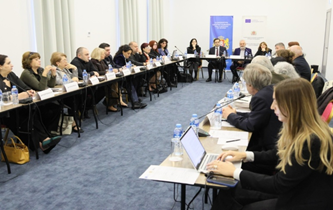
On November 20 and 21, 2025, the Public Defender of Georgia, Levan Ioseliani, held a meeting with members of the Council of National Minorities and representatives of national minorities at the Public Defender’s Office.
The meeting discussed the problems facing national minorities, the report on the activities of the Public Defender’s Office, and the main findings of the Public Defender’s Office.
Representatives of the Public Defender’s Office spoke about the integration of national minorities and their participation in the decision-making process, as well as their access to education – challenges in the process of introducing bilingual education at the stage of early and preschool education, as well as general education. Attention was focused on the popularization of state language teaching, access to higher education, health care services and the media. The rights of prisoners representing national minorities were also discussed.
Within the framework of the meeting, members of the Council of National Minorities operating under the Public Defender and representatives of national minorities provided the Public Defender’s Office with information about the challenges facing national minorities and the views of representatives of national minorities.
The meeting was held within the framework of the European Union project “Support to the Public Defender’s Office of Georgia” (DAI).
